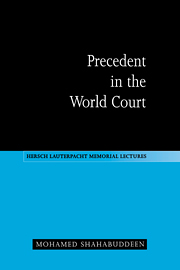Book contents
- Frontmatter
- Contents
- Foreword
- Preface
- List of abbreviations
- 1 Introduction
- 2 The growth of the Court's case law
- 3 Range of precedential resources
- 4 The bases of the system
- 5 The Advisory Committee of Jurists
- 6 The view taken by the League of Nations
- 7 The possibility of judge-made international law
- 8 Stare decisis
- 9 Distinguishing
- 10 Departing from a previous decision
- 11 Ratio decidendi and obiter dictum
- 12 Advisory opinions and decisions of chambers
- 13 The precedential impact of individual opinions
- 14 Effect and scope of the Court's case law
- 15 Conclusion
- Index
- Frontmatter
- Contents
- Foreword
- Preface
- List of abbreviations
- 1 Introduction
- 2 The growth of the Court's case law
- 3 Range of precedential resources
- 4 The bases of the system
- 5 The Advisory Committee of Jurists
- 6 The view taken by the League of Nations
- 7 The possibility of judge-made international law
- 8 Stare decisis
- 9 Distinguishing
- 10 Departing from a previous decision
- 11 Ratio decidendi and obiter dictum
- 12 Advisory opinions and decisions of chambers
- 13 The precedential impact of individual opinions
- 14 Effect and scope of the Court's case law
- 15 Conclusion
- Index
Summary
Stare decisis does not apply
A leading English work says that the ‘general orthodox interpretation of stare decisis … is stare rationibus decisis (“keep to the rationes decidendi of past cases”)’. It is not in dispute that the doctrine does not apply in relation to the Court. There is a broad reason of principle why it should not. Grisel put it thus: ‘[Q]uelque souhaitable que paraisse la stabilité dans n'importe quel ordre juridique, celui des Nations a aussi besoin d'une certaine souplesse, qui permette de prendre en compte la diversité des circonstances et qui est d'ailleurs en harmonie avec l'extrême décentralisation du pouvoir dans la socié internationale.’ Whatever might have been the ratio decidendi of the Status of Eastern Carelia, the literature makes it clear that the contemporary understanding was that the holding could later be departed from precisely because stare decisis did not apply; this lack of assurance as to the precise status of the holding was one of the reasons for United States reservations on the question of acceding to the Protocol of Signature of the Statute of the Court.
In chapter 2 reference was made to remarks in the jurisprudence about the importance of maintaining consistency in holdings. Some of the observations are strong; but they do not amount to an endorsement of the strict doctrine of binding precedent. Take the case of Judge Read.
- Type
- Chapter
- Information
- Precedent in the World Court , pp. 97 - 109Publisher: Cambridge University PressPrint publication year: 1996
- 2
- Cited by



